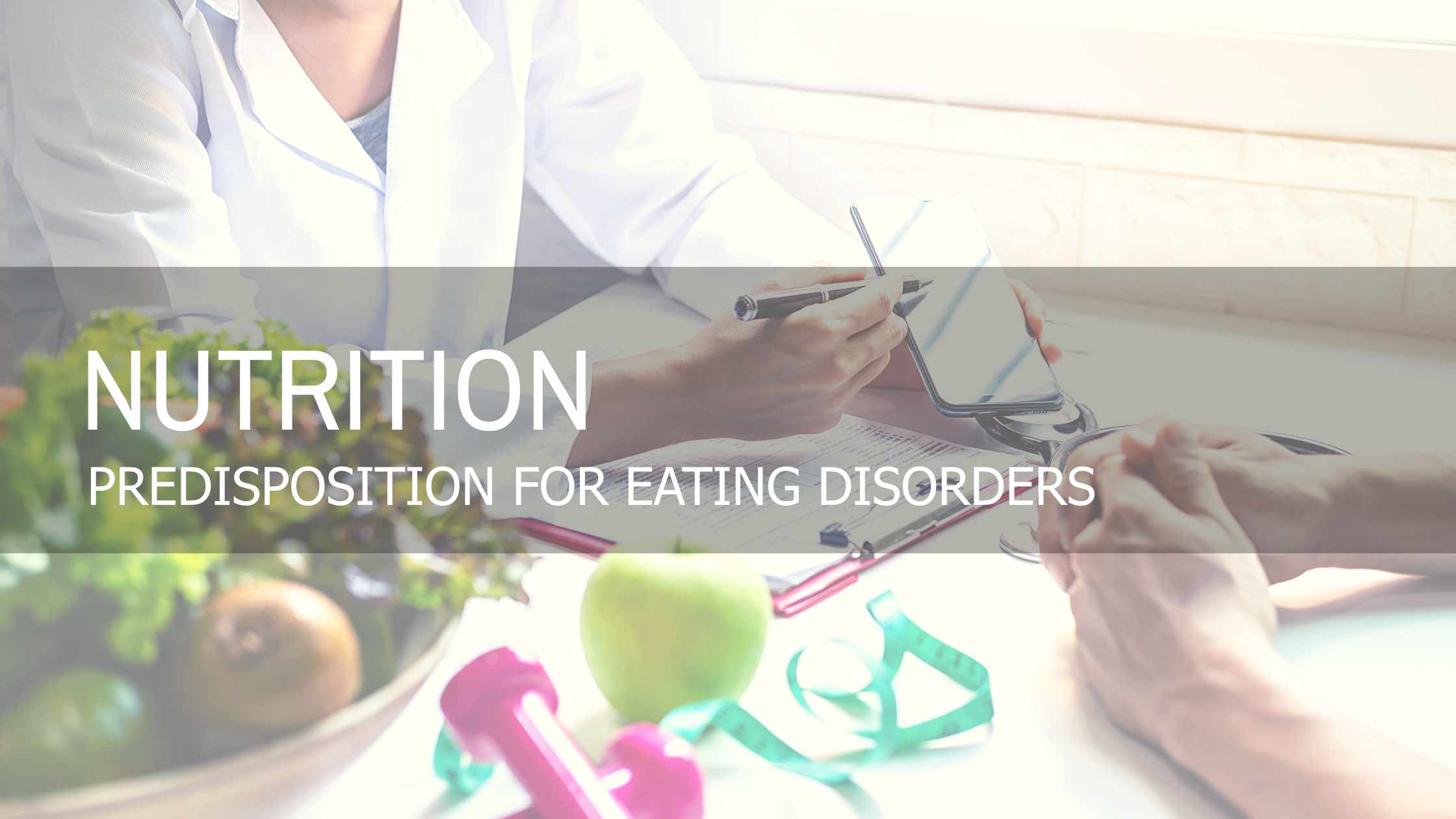
Apr 30 , 2021
0 Comments
Emotional Contributors to Stress | Predispositions for Eating Disorders
Because food is so integral to our survival, there are subconscious and conscious drives that control our thoughts and actions towards food. Those behaviors are influenced by the interactions between biological, genetic, psychological, and environmental factors/influences.
Biological Factors
Biological factors that affect how we approach food include the stress response and chemical imbalances, and hormonal issues, such as diabetes and thyroid irregularities.
Stress
A while back we briefly touched upon how our physiological stress response can make us crave fatty and sweet foods (e.g., in a highly stressed state, the body wants to seek out quick sources of energy via sugar and create excess energy reserves via fat. Additionally, these sources of energy provide temporary boosts in mood). Too much of the stress hormone, cortisol, can deplete the neurochemicals (serotonin and dopamine) which help to regulate mood and levels of motivation.
Hormonal Imbalances and Medical Conditions
Another significant issue that may impact our eating habits may be hormonal imbalances and diseases that impact the metabolism, such as diabetes, hyperthyroidism and hypothyroidism, because they affect how we react to food and how the body uses energy.
Diabetes refers to a group of metabolic conditions where the blood sugar is too high because the body is unable to make adequate amounts of insulin to regulate it. This can lead to issues in fatigue, weight loss, blurred vision, increased thirst and hunger, tingling of the hands and feet, etc.
Thyroid irregularities cause a host of issues in the endocrine system. When it becomes overactive, too much of the hormone, thyroxine, is produced and ramp-up the metabolism. This can cause a change in appetite, weight loss weight, high heart rate, sweating, muscle pain, itching, etc. On the other hand, an underactive thyroid, too little of that hormone is produced. This may lead to fatigue, weight gain, muscle pain, slow body movement, constipation etc.
Personality and Temperament
There is a huge personality element to how we approach food. Individuals who are highly anxious, restless, emotionally impulsive and reactive (feel out of control), have less stress tolerance, and engage in rumination, will be more likely to struggle with eating habits through restriction and/or overeating. This is highly connected to how well the body can react to stress.
Also, those people who struggle with depression, lethargy, and lack of motivation (low in serotonin and dopamine) will tend to overeat as a way to boost their mood.
Environmental Influences
In addition to the biological and psychological factors, environmental influences also play a large role in our eating behaviors. These include: education, socioeconomic status, culture, traumatic experiences, and a lack of support.
Education
Some individuals just lack the knowledge regarding what makes a nutritious diet. Many of us know things on a theoretical level what foods are healthy and unhealthy, but only a fraction understands how to properly apply that knowledge. For example, unless we make a concerted effort to observe what we’re eating, there is a tendency to overestimate the amount of calories consumed and underestimate the amount of nutrients that we take in daily. We usually learn those patterns from the people around us.
Socioeconomic Status
People who struggle with making ends meet often don’t have the time and energy to analyze the quality of their food. They are often more focused on convenience and quantity of food with the best deals possible. This means that there is a tendency to gravitate towards cheap, convenient prepackaged/prepared foods that don’t require much thought and fast food. Additionally, with the financial strain, there’ll be added stress, which in turn, makes those unhealthy foods all the more tempting.
Culture
We often learn our eating habits from the influences of our social groups and culture. For example, if there is a big feast for every family celebration, we may associate food with happiness and feel the need to eat every time we experience a big event. For others, if our friends and family constantly eat sugar and desserts, then there will be a social pull to regularly eat those things too. This is because social connection is a significant undercurrent to most of what we do.
Traumatic Experiences and Lack of Support
People who have experienced many hardships often don’t know how to cope well so they turn to food as a source of comfort. Remember, sugary and fatty foods are temporary sources of the neurochemicals (serotonin and dopamine), which help with mood regulation and motivation. When we don’t feel like we have the support that we need, food can become like a drug to help numb the negative and uncomfortable feelings surrounding those traumatic events.
Adding Perspective
Although predispositions shape our preferences (ex. having a sweet tooth) and push us toward certain behaviors (ex. satiating a craving), it doesn’t mean that we don’t any control over our actions. Being mindful of our thoughts, emotions, goals and incorporating positive coping strategies can have a notable impact.
Pay attention to emotional and physical cues – in order to maintain optimal health, it’s important to check in with yourself on a regular basis. Am I happy? Does everything seem to be in working condition? Has there been any significant changes lately? This may seem silly, but we tend to dismiss potential problems until we are in the thick of it. If you keep in touch with your mind and body, then you can be proactive on treating symptoms, from such things as diabetes, thyroid issues, anxiety, stress, and physical injuries.
Expand your positive support system – When it comes to unhealthy coping mechanisms related to food, it’s commonly a way to self-medicate and numb our feelings, because we don’t feel that we have enough support or people to turn to. So, to replace the negative coping mechanisms, there needs to be positive outlets (friends, family, medical professionals, religion, communities, activities, etc.) to release our stresses, anxieties, and worries.
Practice self-acceptance – it is important to remember that there will always be things that we can’t fix or control. However, there usually ways to alleviate the impact of how things affect us and there are many other things that we have control over. So, just because one thing, such as diabetes, can’t be completely changed doesn’t mean that you can’t work around it and have a fulfilling life.
Incorporate additional positive coping tools and skills – Exercising regularly, reading, journaling, meditation, practicing yoga, socializing with positive people, engaging in productive and rewarding hobbies, being physically active, etc. are some of the many possibilities.



